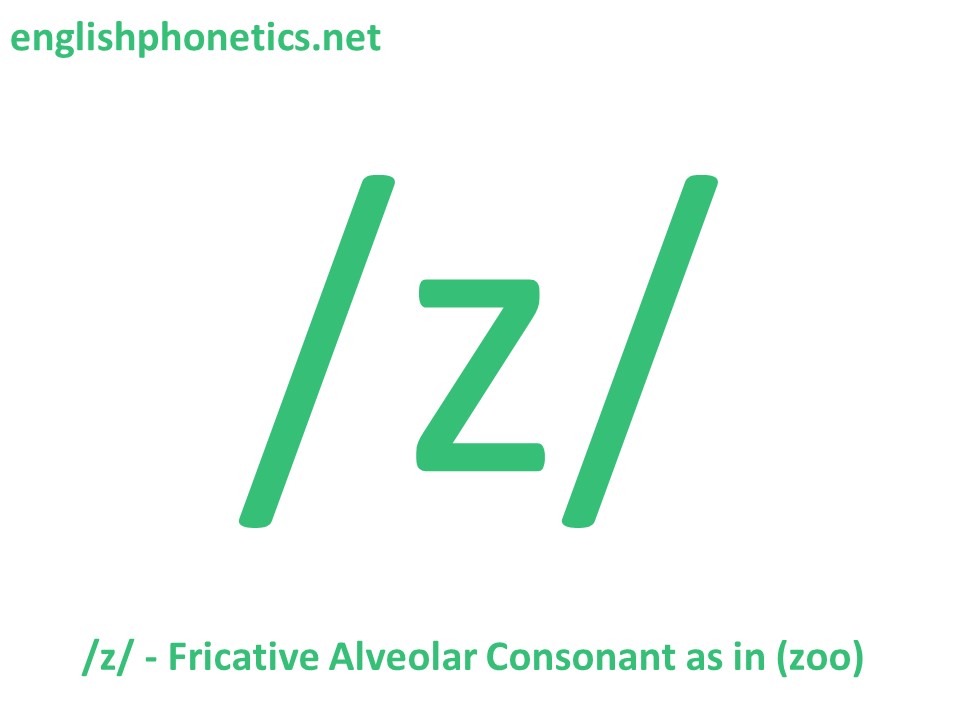Spelling:
- "z" - zip, zoo
- "zz" - sizzle, buzzer
- "ze" - maze, realize
- "s" - bags, losing
- "se" - these, rise
- "es" - loves, clothes
LISTEN
The sound /z/ can be in these clusters.
-
Beginning of a Syllable
(none)
-
End of a Syllable
| z_final_clusters.mp3 |
/zd/ ("sed") - teased
/gz/ ("gs") - begs
/bz/ ("bs"/"bes") - rubs, robes
/rbz/ ("rbs") - barbs
/dz/ ("ds" / "des") - lids, rides
/ldz/ ("lds") - holds
/rdz/ ("rds") - cards
/vz/("ves") - loves
/ðz/ ("ths" / "thes") - cloths, breathes
/rz/ ("rs"/"res") - bars, tires
/mz/ ("ms"/"mes"/"mbs") - seems, homes, climbs
/lmz/ ("lms") - calms
/rmz/ ("rms") - harms
/nz/("ns" / "nes") - means, phones
/lnz/ ("lns") - kilns
/rnz/ ("rns") - horns
/ŋz/("ngs") - rings
/gz/ ("gs") - begs
/bz/ ("bs"/"bes") - rubs, robes
/rbz/ ("rbs") - barbs
/dz/ ("ds" / "des") - lids, rides
/ldz/ ("lds") - holds
/rdz/ ("rds") - cards
/vz/("ves") - loves
/ðz/ ("ths" / "thes") - cloths, breathes
/rz/ ("rs"/"res") - bars, tires
/mz/ ("ms"/"mes"/"mbs") - seems, homes, climbs
/lmz/ ("lms") - calms
/rmz/ ("rms") - harms
/nz/("ns" / "nes") - means, phones
/lnz/ ("lns") - kilns
/rnz/ ("rns") - horns
/ŋz/("ngs") - rings
Grammar Tip:
The "-s" ending is used to mark plural nouns, possessive nouns, and present tense 3rd person singular verbs. The "-s" ending is pronounced /z/ after a vowel or voiced consonant.
| z_grammar.mp3 |
- Plural nouns: bags, days
- Possessive nouns: John's book, Chicago's river
- 3rd person singular verbs: moves, tries
COMPARE
Compare /z/ with /s/:
| compare_z-s_1.mp3 |
/z/.../s/.../z/.../s/.../z/.../s/...
These sounds are both alveolar, fricative consonants. However, /z/ is a voiced consonant and /s/ is a voiceless consonant. If you are pronouncing /z/, your vocal cords should vibrate. At the end of a word, the vowel before /z/ will be longer than the vowel before /s/.
These sounds are both alveolar, fricative consonants. However, /z/ is a voiced consonant and /s/ is a voiceless consonant. If you are pronouncing /z/, your vocal cords should vibrate. At the end of a word, the vowel before /z/ will be longer than the vowel before /s/.
You can hear the difference between /z/ and /s/ in these words.
| compare_z-s_words.mp3 |
1. A. zeal, B. seal
2. A. lies, B. lice
3. A. falls, B. false
4. A. scares, B. scarce
5. A. raising, B. racing
6. A. disease, B. decease
2. A. lies, B. lice
3. A. falls, B. false
4. A. scares, B. scarce
5. A. raising, B. racing
6. A. disease, B. decease
Now, compare /z/ with /dʒ/:
| compare_z-j_1.mp3 |
/z/.../dʒ/.../z/.../dʒ/.../z/.../dʒ/...
These are both voiced alveolar consonants. However, /z/ is a fricative and /dʒ/ is an affricate. If you are pronouncing /dʒ/, the air in your mouth should stop before it is released (creating a “harder” sound).
These are both voiced alveolar consonants. However, /z/ is a fricative and /dʒ/ is an affricate. If you are pronouncing /dʒ/, the air in your mouth should stop before it is released (creating a “harder” sound).
You can hear the difference between /z/ and /dʒ/ in these words.
| compare_z-j_words.mp3 |
1. A. zest, B. jest
2. A. raise, B. rage
3. A. buzz, B. budge
4. A. zoos, B. juice
5. A. ways, B. wage
6. A. chains, B. change
2. A. raise, B. rage
3. A. buzz, B. budge
4. A. zoos, B. juice
5. A. ways, B. wage
6. A. chains, B. change
PRACTICE
Listen and repeat these words:
| words_with_-z-.mp3 |
|
1. zone
2. zoom 3. zipper 4. zombie 5. please 6. as 7. tries 8. jobs 9. begs 10. bores |
11. bronze
12. crazy 13. easy 14. resume 15. reason 16. music 17. because 18. criticize 19. amazing 20. hazardous |
Now, practice /z/ in sentences. Say the words first, then the sentences.
| sentences_with_-z-.mp3 |
1. size - shoes - does
What size of shoes does he wear?
2. kids - visit - zoo
The kids want to visit the zoo.
3. composer - pieces - music
That composer wrote many famous pieces of music.
4. friend's - pleasant - surprise
My friend's arrival was a pleasant surprise.
5. checkers - always - lose
If I play checkers with my sister, I always lose.
6. viruses - cause - diseases
Viruses can cause different diseases.
What size of shoes does he wear?
2. kids - visit - zoo
The kids want to visit the zoo.
3. composer - pieces - music
That composer wrote many famous pieces of music.
4. friend's - pleasant - surprise
My friend's arrival was a pleasant surprise.
5. checkers - always - lose
If I play checkers with my sister, I always lose.
6. viruses - cause - diseases
Viruses can cause different diseases.
To practice with different varieties of English, choose another native English speaker by clicking one of the links below:


